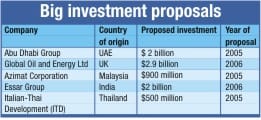Multimillion dollar FDI plans on hold

Six large-scale foreign direct investment proposals have been on hold for the past several years because of government dithering, absence of a coal policy and shortage of gas -- the common setbacks which had earlier prompted Tata Group to pull investment out of Bangladesh.
The investment proposals came from the companies including Abu Dhabi Group, UK-based Global Oil and Energy Ltd, Malaysian Azimat Corporation Ltd, Essar Group of India and Italian-Thai Development Company.
The proposals sought to invest mostly in power and gas infrastructure, coal, steel industry and highways, a Board of Investment official said.
“We are eager to get FDI in infrastructure; but the proposals, under consideration, have some complicated features that require thorough scrutiny before signing any final agreement,” said Kamal Uddin Ahmed, executive chairman of BoI.
Some of the foreign companies, intending to invest primarily in infrastructure, withdrew their plans.
Government officials said Global Oil and Energy signed a memorandum of understanding with the government in June 2006 to invest about $2.9 billion for developing coalmine, oil exploration and production, establishing power plant and producing petrochemicals; but the company shifted their plan.
In September 2005, Abu Dhabi Group expressed its intention to invest $2 billion in various sectors such as telecommunications, oil and gas, healthcare, tourism and pharmaceuticals.
The group's cellular phone company Warid Telecom started its operation in the country, but there have not been much progress in the group's other investment proposals.
In mid-2005, Azimat Corporation, a Malaysian company, proposed to spend over $900 million to construct the first expressway of the country, connecting Dhaka with the country's premier port city of Chittagong.
The BNP-led alliance government almost finalised the deal, but the caretaker government stalled the plan, preferring to go for international bidding for the project. This would hold back the possibility of any foreign investment in this vital area at least for another year.
In February 2002, led by a local firm, Contech Ltd, another consortium of six companies proposed to build a 52km long underground rail in Dhaka at a cost of $900 million.
Italian-Thai Development (ITD), a Thai construction company, intended to negotiate with the government over its possible participation in the proposed Dhaka-Chittagong Express Way. But the government failed to initiate talks with the company.
A local consortium of four steel makers S Alam, PHP, KDS and Abul Khair has signed a memorandum of understanding with India's Essar Group to set up the country's first hot-rolled steel plant. Essar has agreed to take about 60 percent of the project cost of $2 billion on its shoulder.
Dr Mustafizur Rahman, executive director of the Centre for Policy Dialogue, said the flow of foreign direct investment in the country had declined as the government failed to ensure availability of gas.
The government must provide available energy resources to local as well as foreign companies as required by growing economic growth, he said.

 For all latest news, follow The Daily Star's Google News channel.
For all latest news, follow The Daily Star's Google News channel. 




Comments